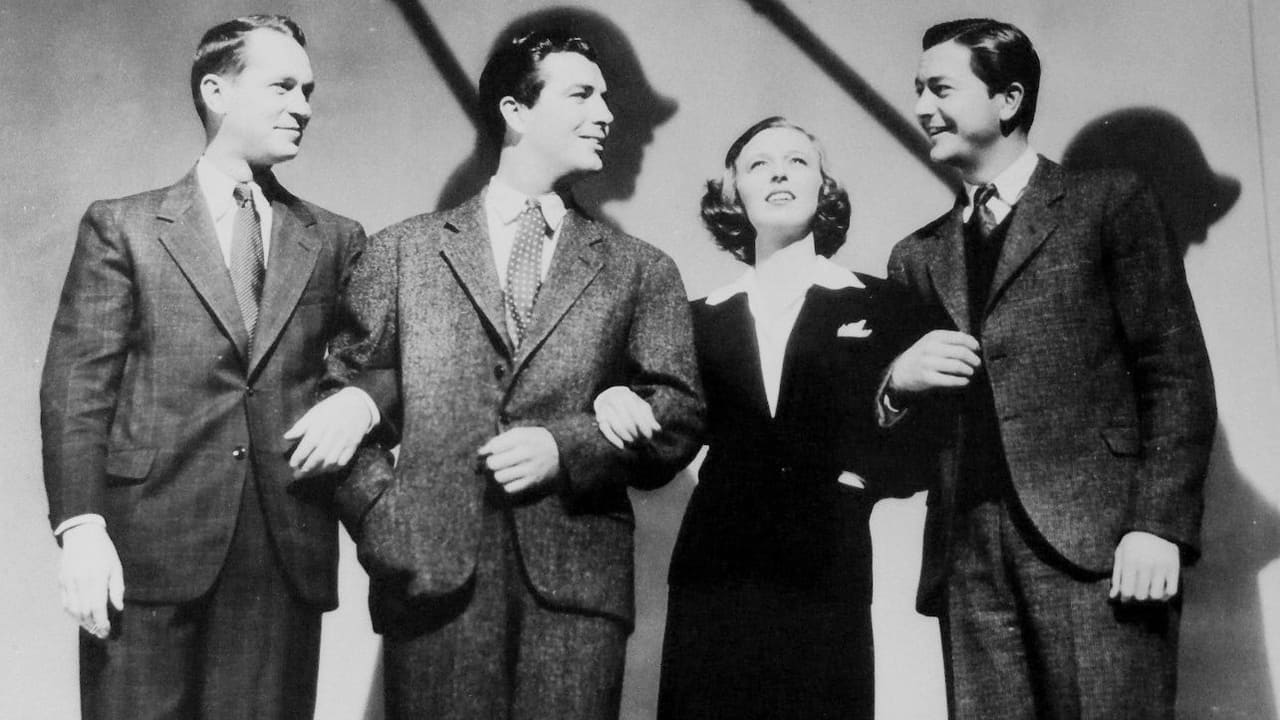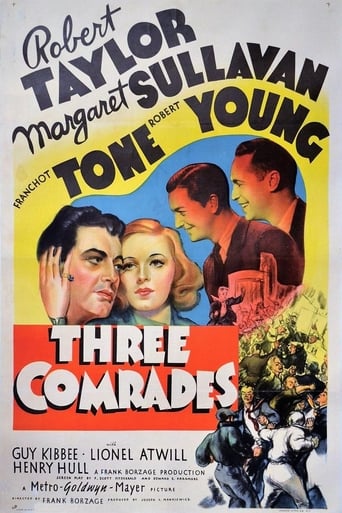

Overrated and overhyped
... View MoreA lot of perfectly good film show their cards early, establish a unique premise and let the audience explore a topic at a leisurely pace, without much in terms of surprise. this film is not one of those films.
... View MoreIt's simply great fun, a winsome film and an occasionally over-the-top luxury fantasy that never flags.
... View MoreGreat example of an old-fashioned, pure-at-heart escapist event movie that doesn't pretend to be anything that it's not and has boat loads of fun being its own ludicrous self.
... View MoreThis is a fine and interesting movie up until Miss Sullavan appears. Then the ride to Boringville begins. She is neither a good enough actress nor attractive enough to hold your attention. She does not make her character at all dear enough to care about, which makes you wonder why the three male leads come to adore her. This was almost impossible to sit through. What could have been a strong dramatic story about three WWI Comrades-in- arms coping with the trials of post war Germany, is ruined by teary melodramatics centered on Sullavan. Too bad.
... View MoreRobert Taylor, Franchot Tone, and Robert Young are "Three Comrades" in this 1938 film directed by Frank Borzage and starring Margaret Sullivan as the young woman who enters their lives.The setting is Germany after World War I, and the three friends return from battle and open a mechanic's shop. When they meet the ethereal Pat (Sullivan), they all embrace her as a friend, but it's she and Erich (Taylor) who fall in love. Only Otto (Tone) knows that she has tuberculosis; he encourages her to marry Erich and be happy. On their honeymoon, she collapses, and Erich learns the truth.This film represents F. Scott Fitzgerald's only writing credit in Hollywood, though he worked on other films, including "Marie Antoinette," "Red Headed Woman," "The Women," and others, uncredited in all. In "Tender Comrades" you can often hear his gentle prose.The original script was much more political, but MGM, careful of its foreign market, excised all of that out. There is unrest in Germany post-World War I, but it's vague unrest; Gottfried (Young) has involvement in a political group that's against the current government, but we don't get too much info about it.I don't know if it's because the film is set in Germany, a fairly depressing place until the '50s, or because we know that, though the Germans have been through a lot, they ain't seen nothing' yet, or Pat's discreet coughs, but this movie is depressing even when the characters are having a good time. It's almost as if they all play their roles as if they know the ending. I'm not giving spoilers here - it's obvious from the beginning of the film what's going to happen. No surprises.Despite this sense of foreboding, the film is very well done, if a bit slow by today's standards. Robert Taylor had better roles and developed into a better actor post-war, though he is a revelation in the film "Escape," but he is so handsome and sweet in this film. It's no wonder my mother was mad for him. Tone has the burden of some heavy monologues -- some of the dialogue is tough going -- but he is good nonetheless, as is Robert Young.Margaret Sullivan was a wonderful screen presence, pretty, with a low voice, and as a stage-trained actress, she was always excellent. Pat is really the only character that has any business being depressed throughout the film, and she comes off as a mystery woman at the beginning. It's obvious she has a secret and has seen bad times. She plays the role as if she's not really of this earth, and she's wonderful.Recommended, but don't see it if you haven't taken your antidepressants.
... View MoreFollowing the Great War (aka World War I), three German soldiers vow to stick together through thick and thin. The "Three Comrades" are: temporarily disillusioned Robert Taylor (as Erich Lohkamp), cautiously optimistic Franchot Tone (as Otto Koster) and politically idealistic Robert Young (as Gottfried Lenz). They begin a soon-to-be struggling automobile repair business. The hesitatingly optimistic trio become a quartet upon meeting beautifully fatalistic Margaret Sullavan (as Patricia "Pat" Hollmann). This is, of course, Germany between the two World Wars of the 20th century...This allegorical film is too American for its own good, but the story holds up well. It benefits greatly by being from a 1936 novel by "All Quiet on the Western Front" (1929) author and young war veteran Erich Maria Remarque. The additional dialog by F. Scott Fitzgerald, Edward E. Paramore Jr. is more astute than askew...The intent is for Mr. Taylor's protagonist to carry the better qualities of the "Three Comrades" to a full representation of Germany. But, coming on like a cross between Greta Garbo and June Allyson, Ms. Sullavan takes the film away. And, considering the events of the 1940s, her character represented a bigger part of the whole. Sullavan was honored as "Best Actress" of 1938 by the "New York Film Critics" for her prescient performance. Her comrades contribute memorably and director Frank Borzage does exceptionally well with his "Hallelujah Chorus" revenge and some great closing scenes.******** Three Comrades (6/2/38) Frank Borzage ~ Margaret Sullavan, Robert Taylor, Franchot Tone, Robert Young
... View MoreHow does one not fall in love with Margaret Sullavan? The husky calm of her unique voice could invoke so many emotional inflections that combined with her will-o'-the-wisp beauty it's a shame she is not well remembered beyond her one indisputable classic, Ernst Lubitsch's "The Shop Around the Corner" (1940) with James Stewart. Take, for example, this 1938 romantic drama based on Erich Maria Remarque's ("All Quiet on the Western Front") 1936 novel with a screenplay co-written by none other than F. Scott Fitzgerald, his only screen credit. Not surprisingly, it's about the Lost Generation who came of age during World War I, and she elevates the movie into something quite magical as Patricia Hollmann, a beautiful aristocrat fallen on hard times and dying of tuberculosis. She becomes the center of gravity for three close war buddies eking out a living fixing cars and driving a cab in a pre-Hitler Germany torn asunder by unemployment and economic strife.The main focus of the story is on the unbridled love that develops between Patricia and Erich, the most openly naïve of the three and probably the most in need of purpose in his life. Just graduating from his glamour-boy phase swooning over Garbo in "Camille", Robert Taylor is no dramatic match for Sullavan but gives Erich enough sincerity to avoid embarrassment. Better are Robert Young as the headstrong Gottfried and especially Franchot Tone as wise Otto whose unconditional friendship is nearly as touching as the central romance. In the second of four collaborations with Sullavan, director Frank Borzage imbues the film with his trademark romanticism particularly lush in this handsome MGM production captured pretty well in the 2009 DVD. No surprise, the ending death scene may seem hackneyed by today's standards, but it compares favorably to Bette Davis's similarly heroic demise in "Dark Victory". This is well worth seeking out if only to rediscover Sullavan at her most radiant. She earned the New York Film Critics Award and an Oscar nomination and sadly made only 16 films in her career. Read her daughter Brooke Hayward's harrowing memoir, "Haywire", to find out why.
... View More